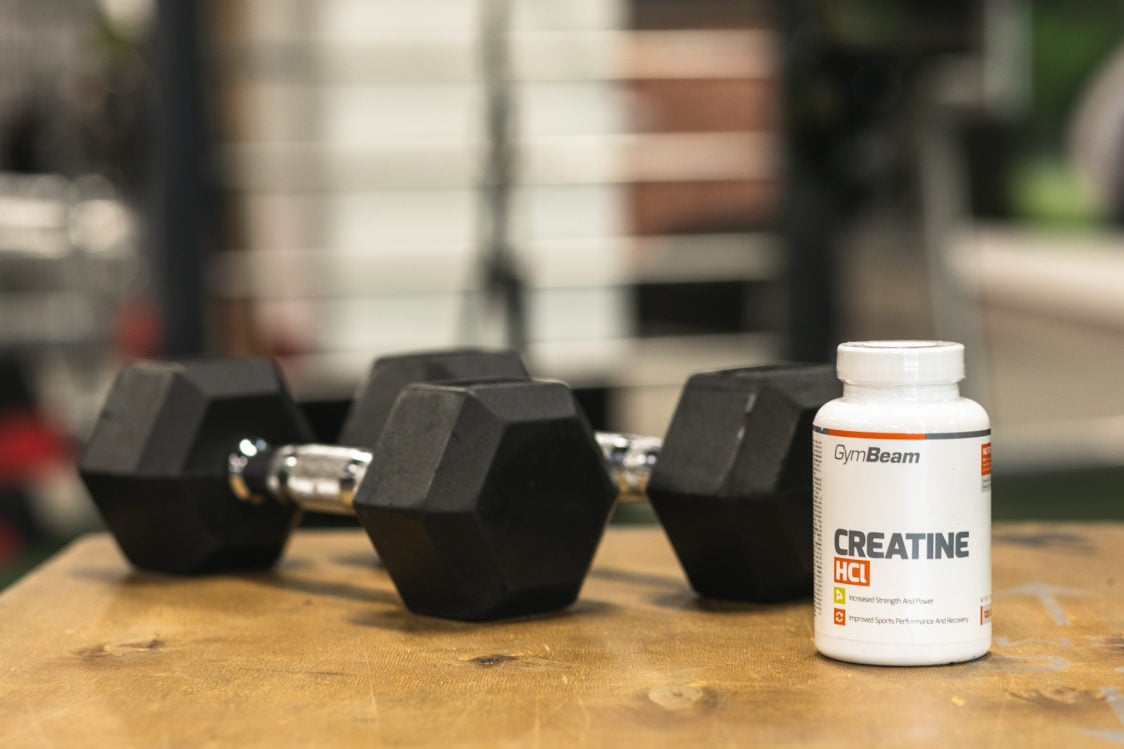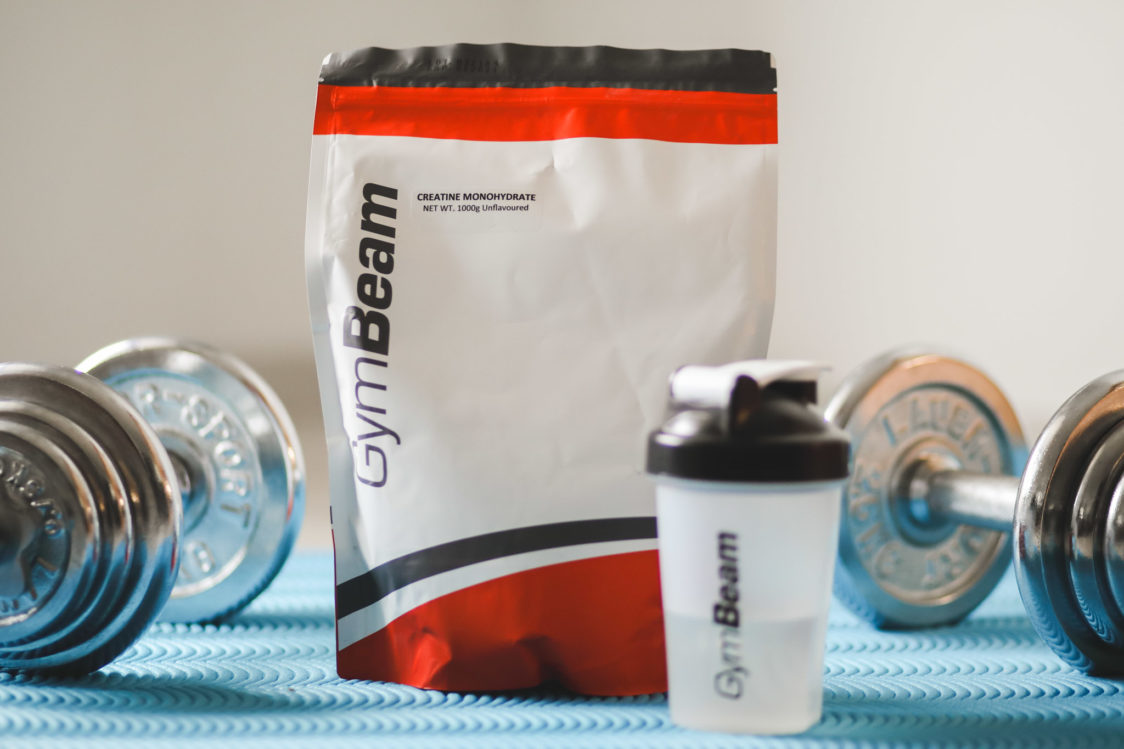Table of Contents
Creatine is a well-known and popular nutritional supplement among athletes who want to improve their sports performance, increase their strength or gain muscle mass. It is one of the most researched and well-known supplements. However, not many people use it because of its other benefits. Creatine does not only affect sports performance, but also, for example, the processes of the brain and the nervous system, the function of the immunity or mental health. That’s why today we will focus on other and perhaps even surprising benefits of creatine that go beyond just strength and muscles.
In this article you will find out about the effects of creatine on:
What is creatine?
Creatine is a substance that is naturally found in the human body. It consists of the amino acids such arginine, glycine and methionine, from which your body can produce creatine. The main task of creatine is the immediate supply of energy to tissues with an increased need for it, such as muscles and the brain.
Up to 95% of creatine in the body is stored in skeletal muscles, and the rest is found in the brain, kidneys, liver and, in men, in the testicles. An average 70 kg man has approximately 120 to 140 g of creatine stored in his body. However, about 1-2% of this amount is naturally converted into creatinine, which is excreted in the urine. [6]
The body needs to supplement this amount of 1-3 g of creatine in order to maintain its normal level. That mainly depends on the amount of muscle mass. About half comes from your diet and the rest the body creates on its own. Creatine is produced in the body mainly by the liver and in a smaller amount by the pancreas and kidneys. [12]
Thanks to a normal diverse diet, your creatine reserves in the body are filled to roughly 60-80%. By supplementing, these reserves can be increased by the missing 20-40%. [12]

What food contains creatine?
Similar to humans, creatine in animals is mainly stored in skeletal muscles. Therefore, its best sources are animal foods such as meat and fish. A certain amount of creatine is also found in the intestines. For example, vegans and vegetarians, who don’t consume these foods, often have reduced creatine reserves and could benefit from its supplementation.
For people who eat meat and fish, it might be interesting to know that on average they contain 3-5 g of creatine per 1 kg. [5,11]
On average, how much creatine do specific types of meat, variety meats and fish contain?
| Creatine Content (g/1 kg) | 4.7 – 5.5* | 3.4 – 4.1* | 3.4 | 0.23 | 0.2 | 4 | 4.5 |
From a regular 150 g portion of beef, you can obtain approximately 0.6 g of creatine which is close to approximately half the amount that you should obtain from your diet.
You might be interested in these products:
How does creatine work?
Creatine serves as an immediate source of energy, thanks to the fact that it can very quickly regenerate the adenosine triphosphate (ATP), which is the main source of energy in the body.
After using the energy from ATP, for example when running or lifting weights, the ADP (adenosine diphosphate) molecule is created. However, in order to draw additional energy, ADP must be converted back to ATP. However, in certain situations, for example during intense anaerobic exercise, ATP cannot be regenerated quickly enough. That’s when creatine comes into play.
Roughly 60% of creatine is found in the body in the form of phosphocreatine. Phosphocreatine contains a phosphate group, which, if necessary, quickly binds to ADP and creates ATP. This role of creatine is most important in situations when the body needs an immediate and abundant supply of energy, such as in the case of the already mentioned high-intensity performances. [5]
However, muscle mass is not the only part of the body that needs a quick supply of energy. This function of creatine is also used in other processes in the body.

What are the effects of creatine on health?
Creatine is well-known among athletes, who use it to improve their performance, support strength or aid building muscles. However, its benefits don’t end there. It turns out that creatine also plays an important role in, for example, neurological processes, regeneration or maintaining a stable blood sugar levels. What are the effects of creatine?
1. It supports strength, performance and growth of muscle mass
The best-known and most researched effect of creatine is its ability to immediately provide energy to the muscles and thus improve performance and strength. The use of creatine increases the reserves of creatine phosphate in the muscles, which can subsequently be used during repeated short periods of high-intensity exercise. It allows you to maintain a higher intensity of performance and thus achieve better results. [6,12]
Creatine supplementation also helps with the growth of muscle mass. Creatine likely contributes to the formation of proteins that make up muscle fibres. In addition, it also binds a certain amount of water, which increases its content in muscle cells. This subsequently causes a higher volume and weight of the muscles.
2. It has a positive effect on regeneration
Creatine apparently helps the body to regenerate after a demanding physical exercise. Creatine supports the storage of dietary carbohydrates in the form of glycogen in the muscles. Glycogen is important for the proper regeneration of muscle mass, which can also help prevent overtraining. [12]
During demanding physical performance, for example strength training, muscle fibres are naturally damaged. Creatine has been shown to speed up their healing. In studies that monitored the effect of creatine on muscle damage after exercise, there was a decrease in indicators of muscle damage (substances whose amount increases during muscle damage), such as creatine kinase. [9]
It can also play its role in the case of muscle atrophy (loss of muscle mass, e.g. due to health reasons, lack of exercise, etc.) or in rehabilitation after an injury. It has been shown to reduce the inflammatory reaction that is typical for muscle damage.

3. It also affects the brain and cognitive abilities
The cells of the nervous system and brain require a large amount of energy for their proper function. The brain consumes up to 20% of the total daily energy intake. Just as in muscle cells, creatine serves in this case as a quick source of phosphate groups for the formation of ATP. Creatine likely provides the brain with energy during energy-demanding situations, such as various complicated cognitive tasks or in stressful conditions, such as lack of sleep or hypoxia (lack of oxygen). This is also one of the reasons why creatine is naturally found in the brain. [15]
There are some genetic disorders of creatine metabolism, which are manifested by mental and developmental disorders. Therefore, creatine appears to have an important role in mental and cognitive abilities. [2,7,15]
However, unlike muscles, the brain can create creatine by itself and is not so dependent on food intake or production from other organs. However, if the initial level of creatine is low for various reasons, its supplementation can have a positive effect.
It is not by accident that in recent years creatine has been included among nootropics. These substances have scientifically proven effects on brain functions, such as memory, concentration, learning ability, etc.
You can find out more about nootropics in our article Nootropics: Substances to Improve Concentration and Memory. Which Are the Best?

Creatine and sleep deprivation
Insufficient sleep puts a relatively large burden on your body and brain. It has been shown that a sleep-deprived brain has lower levels of creatine compared to a brain that has had a sufficiently long and high-quality sleep. Regular use of creatine can thus probably contribute to the improvement of brain function during sleep deprivation. [7]
However, even if scientists were 100% sure of this effect, it wouldn’t be reasonable to rely just on creatine and neglect sleep. High-quality sleep lasting 7-9 hours is still the best thing you can do for the function of your body and brain. [19]
In what situations can the use of creatine be useful for the brain?
- Demanding cognitive tasks (information processing, memory, attention, concentration, etc.)
- Situations in which higher performance of the brain is necessary -demanding work periods, increased school commitments, working shifts, etc.
- Lack of sleep
- Genetic disorders of creatine metabolism [7]
When using creatine supplements, its levels in the brain grow slower compared to muscles. It seems that its amount increases by 5-15%. However, there is currently no exact recommended dosage of creatine for improving brain functions. Nevertheless, it is likely that higher doses should be taken compared to those that are recommended for muscle function support (3-5 g every day). [7,12,15]
4. It can also affect depression and other mental disorders
Reduced amount of creatine often shows in people who suffer from mental disorders, such as depression, schizophrenia or bipolar disorder. It seems that an insufficient amount of creatine in the brain could contribute to the development of these disorders. Its supplementation and consequent restoration of optimal creatine reserves probably helps to alleviate their symptoms.
The results of several studies indicate that vegetarians, who lack meat and creatine in their diet, have a higher risk of developing depression than people who eat meat. Those who don’t even have fish in their diet can have an even greater deficiency. Supplementing creatine and increasing its levels in the brain can thus have an anti-depressant effect. [7,11]

5. It may help protect the nervous system from damage
Creatine also acts as an antioxidant protecting nerve cells from the effects of free radicals. These have harmful effects on cells and in the case of oxidative stress they attack and break them, which can promote the development of various diseases. [4]
The health of cells, including nerve cells, is largely dependent on the function of their mitochondria. Mitochondria are often described as cellular powerhouses that produce life energy in the form of the aforementioned ATP. But at the same time, they are the place where a large amount of the mentioned free radicals are formed. Creatine’s antioxidant effect appears to protect the mitochondria, thereby providing protection to the cells themselves. It can thus help protect against various neurological diseases, such as Alzheimer’s disease. [4]
6. It can affect the course of neurodegenerative diseases
Creatine probably also has an effect on the course of some neurodegenerative diseases, such as Parkinson’s or Huntington’s disease.
People suffering from Parkinson’s disease have a reduced amount of dopaminergic receptors that produce dopamine. Due to the lack of dopamine, transmission of impulses between individual nerve cells is reduced. This is subsequently manifested by tremors, limited muscle function or, for example, speech impediments. Research shows that the use of creatine could have a positive effect on muscle function and thus improve some symptoms of Parkinson’s disease. [14]
A reduced level of phosphocreatine in the brain is typical for some neurological diseases. This is, for example, Huntington’s disease, which is manifested by jerky movements and reduced mental abilities. Taking creatine can seemingly play a role in protecting neurons from metabolic damage. It also seems that it could support the formation of nerve cells that lose their function in Huntington’s disease (specifically GABAergic neurons). [1,12]

7. It helps to reduce blood sugar
It turns out that taking creatine could also be useful for people who need help with maintaining a stable blood sugar level (so-called glycemia). These are people who suffer from diabetes mellitus or, for example, people with impaired glucose tolerance. This is a condition where the body already has a problem maintaining the blood sugar level in the optimal range, but it is not yet full-blown diabetes.
Creatine probably helps to lower blood sugar by promoting insulin secretion and reducing insulin resistance. Creatine increases the function of the glucose transporter type 4, which is located in the wall of the muscle cell and serves as a bridge that moves sugar from the blood into the cells. By increasing the function of the GLUT4, a larger amount of blood sugar is moved into the cells and its level decreases. [16,18]
Insulin and creatine actually work great together. Creatine gets transported into the cells with the help of insulin. Therefore, it is advantageous to take creatine together with carbohydrates. This will help creatine enter the cells and support its storage. [12]
You can learn more about how insulin works in our article Insulin Sensitivity – How to Increase It and Prevent Insulin Resistance.
8. It might have a positive effect on heart health
Cardiac muscle also seems to be influenced by creatine. It has been shown that creatine probably plays an important role in maintaining energy supply during various ischemic events. Ischemia is a condition in which the blood flow is restricted or reduced in a part of the body, for example, in the case of a myocardial infarction. It can thus probably at least partially protect the heart at the time of an ischemic event. [12]
It is possible that creatine also plays a role in the prevention of atherosclerosis, which leads to the narrowing of blood vessels, damage to the vessel wall and a higher risk of a heart attack. Creatine could play a role, for example, directly in the blood vessel wall. When its levels are high in the cells of the wall, it appears to reduce the adhesion of some immune cells to the vessel wall. [21]

9. It also plays a role in the immune response
Studies indicate that creatine has immunomodulatory effects, meaning that it helps to regulate the immune system. It seems to affect the function and production of T-lymphocytes, which are involved, among other things, in the recognition of infection or tumor cells. A higher supply of ATP thanks to creatine could support the function of the receptors through which T-lymphocytes work.
Creatine also apparently reduces the production of pro-inflammatory cytokines and thus has an anti-inflammatory effect. Cytokines also influence the behaviour of other cells of the immune system, the so-called macrophages. It seems that through them, creatine can support processes that lead to, for example, tissue healing.
One of the main functions of macrophages is the so-called phagocytosis, in which these immune cells engulf and destroy foreign and damaged (e.g. tumour) cells. It is a very energy-demanding process, which can probably be supported by using creatine. [10,18]

10. It can help relieve fatigue
Research suggests that lower levels of creatine in the brain are associated with greater mental fatigue. At the same time, it seems that in this state the amount of lactic acid, which is produced in anaerobic conditions (without access to oxygen) increases.
It is therefore possible that fatigue occurs when the energy needs of the brain are not met. Even in this case, creatine could probably serve as a quick source of energy and thus alleviate fatigue.
Increasing creatine levels could also help with fatigue that is related to the aforementioned lack of sleep. [3]
You can read more about how to fight fatigue in the article Why Are You Always Tired? 7 Most Common Causes and Their Solutions.
11. It can also support the health and condition of the skin
Local application of creatine to the skin, for example in the form of a cream, could also have a positive effect. It seems that creatine also has an effect on the production of collagen and could help, for example, with reducing the formation of wrinkles. [21]
12. It also affects health when ageing
It’s clear from the previous points that not only athletes can benefit from creatine. It is also not true that creatine is only suitable for young people. On the contrary, its use seems to bring great benefits to the elderly.
Research suggests that it could possibly improve the symptoms of sarcopenia. Sarcopenia is a gradual loss of muscle mass and strength and is associated with a higher risk of injuries, impairment of body functions and higher mortality. This condition is said to generally affect up to 10% of people over 60 years of age, with the proportion likely to be much higher in older people with poor health. Creatine seemingly has the ability to influence several parameters associated with sarcopenia. [8]
- It can have an effect on improving or maintaining muscle strength through rapid regeneration of ATP in places where it’s needed.
- At the same time, it probably has the ability to reduce muscle atrophy by affecting various processes that ensure muscle growth.
- The antioxidant effect of creatine and its ability to fight free radicals also play an important role.
- The effects of creatine are probably even higher when it is combined with strength training. [8]
In the elderly, the effect of creatine on cognitive abilities and memory, which often deteriorate with age, can be very useful. Older adults also have a higher risk of developing type 2 diabetes. Creatine, together with a healthy diet and exercise, seems to help regulate blood sugar levels. And we can’t forget to mention its possible positive effects on immunity or the nervous system, the function of which often decreases with age. [12]

Should you supplement with creatine?
An average person doesn’t need to immediately reach for creatine in the form of a nutritional supplement. If you regularly consume foods rich in this substance, your intake of creatine is probably adequate and the reserves in your body are approximately at 60-80%.
However, for those who avoid meat, fish and variety meats, the supplement may be beneficial. It can also benefit people who want to use the full potential of creatine and have its reserves in the body charged to 100%. This can then help them move the performance of their muscles, brain or other areas of health to a higher level.
How to take creatine and which creatine is the best?
Creatine can be found on the market in several different forms. Of all its types, however, the most researched and reliable is creatine monohydrate. The most effective way to start using creatine used to be considered the so-called saturation phase. In this method of supplementation, 5 g of creatine is used four times a day for 5 days. During this period, the creatine reserves in the muscles get completely saturated and then the maintenance phase starts with the use of 3-5 g per day.
Currently, however, the prevailing opinion is that it is sufficient to take 3-5 g of creatine per day over a long period of time and gradually increase its reserves in the muscles. Complete saturation occurs in approximately 28 days. [12]
The article Everything You Need to Know about Creatine and Its Forms will tell you everything about using creatine and choosing the right type. You can also get advice on How to Choose the Best Creatine.

Is creatine safe and how long to take it for?
Research shows that creatine can be used long-term in the recommended doses. Some studies have followed the effects of creatine for up to five years. Even after such a long time, no unwanted side effects were observed.
For example, there were concerns that creatine supplementation damages the kidneys or causes dehydration. However, none of this has been confirmed and creatine is considered a safe food supplement.
You can read more about the safety of creatine in our article 4 Myths and Facts about the Side Effects of Creatine.
What should you remember?
Although most people associate creatine mainly with muscle strength and sports performance, its effects extend far beyond that. Thanks to its ability to quickly regenerate ATP, it is used in many other processes in the body. According to research, it can supply energy to the brain in various demanding or stressful situations. At the same time, it can have a positive effect on the nervous and immune system, mental health and other areas of your life.
You can get creatine naturally from animal foods, especially meat and fish. If you want to take advantage of full creatine reserves, using a nutritional supplement is appropriate.
If you found the article useful and interesting, don’t hesitate to share it with your friends.
[1] ANDRES, R.H. et al. Creatine supplementation improves neural progenitor cell survival in Huntington’s disease. – https://www.ncbi.nlm.nih.gov/pmc/articles/PMC6126277/
[2] AVGERINOS, K.I. et al. Effects of creatine supplementation on cognitive function of healthy individuals: A systematic review of randomized controlled trials. – https://www.ncbi.nlm.nih.gov/pmc/articles/PMC6093191/
[3] BALESTRINO, M. - ADRIANO, E. Beyond sports: Efficacy and safety of creatine supplementation in pathological or paraphysiological conditions of brain and muscle. – https://pubmed.ncbi.nlm.nih.gov/31012130/
[4] BEAL, M.F. Neuroprotective effects of creatine. – https://pubmed.ncbi.nlm.nih.gov/21448659/
[5] BURKE, L. Clinical Sports Nutrition.
[6] COOPER, R. et al. Creatine supplementation with specific view to exercise/sports performance: an update. – https://www.ncbi.nlm.nih.gov/pmc/articles/PMC3407788/
[7] DOLAN, E. et al. Beyond muscle: the effects of creatine supplementation on brain creatine, cognitive processing, and traumatic brain injury. – https://pubmed.ncbi.nlm.nih.gov/30086660/
[8] DOLAN, E. et al. Muscular Atrophy and Sarcopenia in the Elderly: Is There a Role for Creatine Supplementation? – https://www.ncbi.nlm.nih.gov/pmc/articles/PMC6921011/
[9] JIAMING, Y. - RAHIMI, M.H. Creatine supplementation effect on recovery following exercise-induced muscle damage: A systematic review and meta-analysis of randomized controlled trials. – https://pubmed.ncbi.nlm.nih.gov/34472118/
[10] KAZAK, L. - COHEN, P. Creatine metabolism: energy homeostasis, immunity and cancer biology. – https://pubmed.ncbi.nlm.nih.gov/32493980/
[11] KIOUS, B.M. et al. Creatine for the Treatment of Depression. – https://www.mdpi.com/2218-273X/9/9/406
[12] KREIDER, R.B. et al. International Society of Sports Nutrition position stand: safety and efficacy of creatine supplementation in exercise, sport, and medicine. – https://www.ncbi.nlm.nih.gov/pmc/articles/PMC5469049/
[13] KULCZYŃSKI, B. et al. Characteristics of Selected Antioxidative and Bioactive Compounds in Meat and Animal Origin Products. – https://pubmed.ncbi.nlm.nih.gov/31443517/
[14] MARQUES, E.P. WYSE, A.T.S. Creatine as a Neuroprotector: an Actor that Can Play Many Parts. – https://pubmed.ncbi.nlm.nih.gov/31069754/
[15] ROSCHEL, H. et al. Creatine Supplementation and Brain Health. – https://www.ncbi.nlm.nih.gov/pmc/articles/PMC7916590/
[16] SOLIS, M.Y. et al. Potential of Creatine in Glucose Management and Diabetes. – https://www.ncbi.nlm.nih.gov/pmc/articles/PMC7915263/
[17] Creatine — Health benefits, dosage, safety, side-effects, and more. – https://examine.com/supplements/creatine/
[18] Creatine in Health and Disease. – https://www.ncbi.nlm.nih.gov/pmc/articles/PMC7910963/
[19] National Sleep Foundation’s sleep time duration recommendations: methodology and results summary. – https://www.sciencedirect.com/science/article/abs/pii/S2352721815000157
[20] Carnosine, anserine, creatine, and inosine 5 ’-monophosphate contents in breast and thigh meats from 5 lines of Korean native chicken. – https://www.researchgate.net/publication/258530528_Carnosine_anserine_creatine_and_inosine_5_'monophosphate_contents_in_breast_and_thigh_meats_from_5_lines_of_Korean_native_chicken
[21] Research Breakdown on Creatine - Examine. – https://examine.com/supplements/creatine/research/

